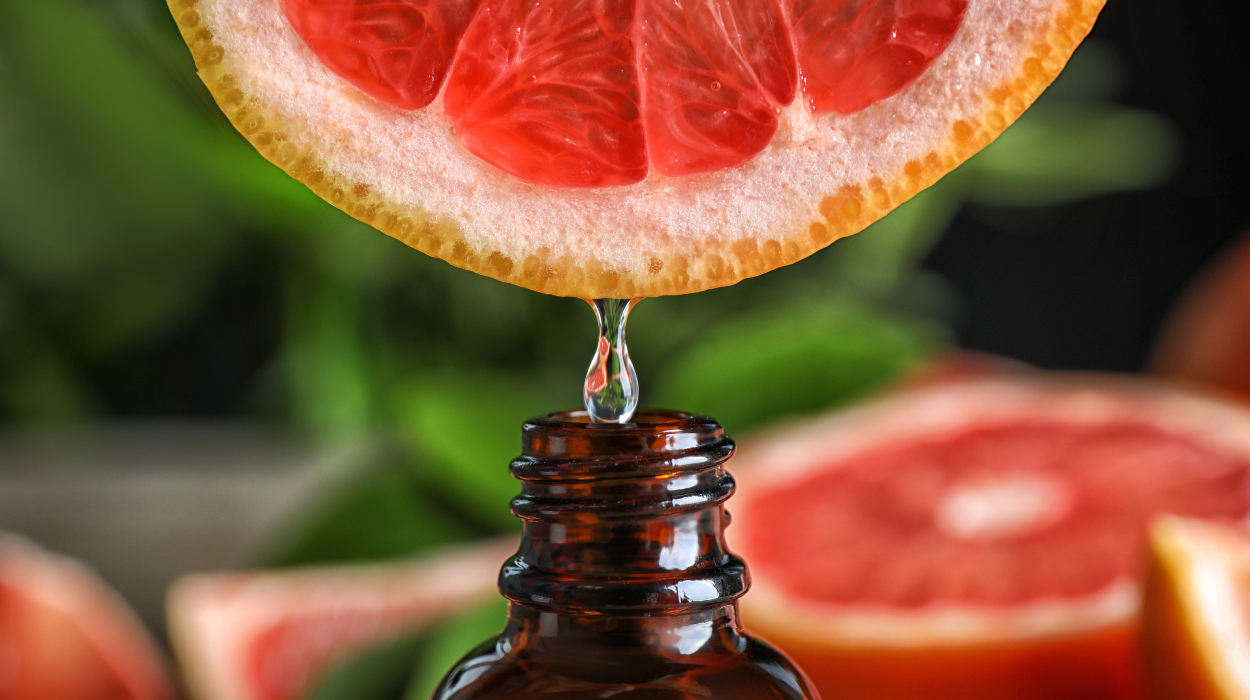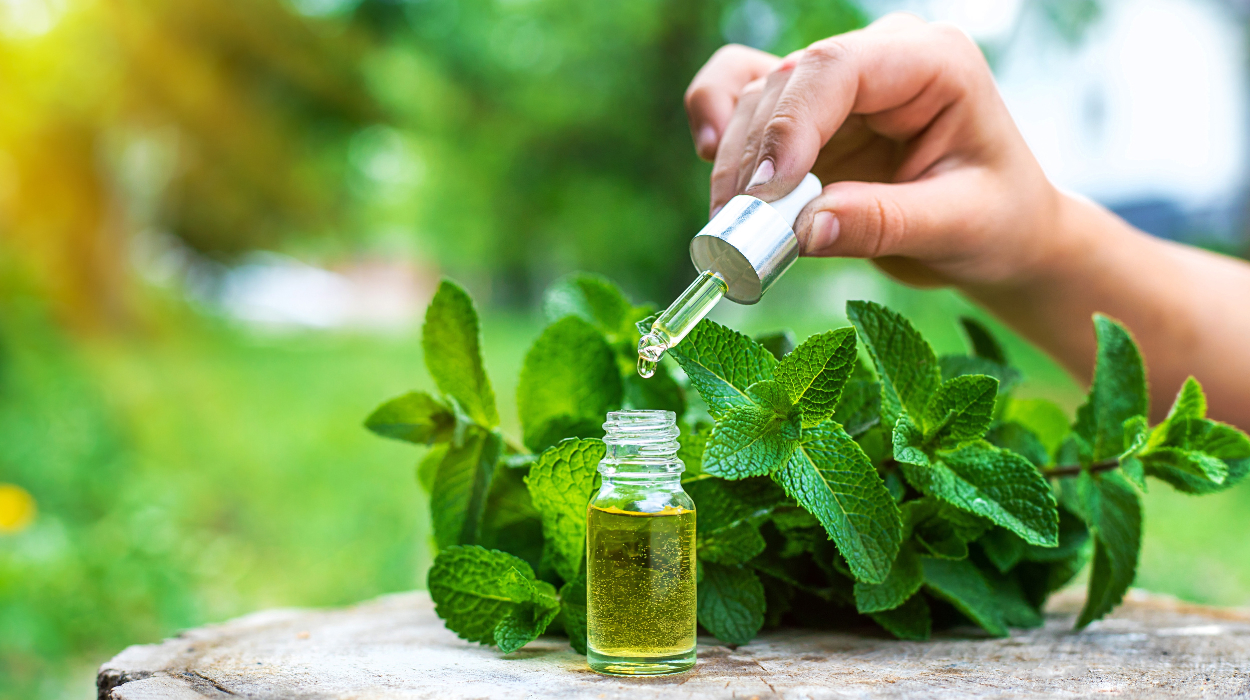Navigating the path to weight loss can be a sensory experience that goes beyond diet and exercise. A whiff of the right essential oils for weight loss may give you an unexpected edge in your efforts.
As you investigate how many grams of fat per day are needed to enhance weight loss, consider the role of scent in shaping your wellness journey. Essential oils have been recognized for their ability to modulate cravings, uplift mood, and even promote a sense of satiety.
When integrated thoughtfully, these scents can become a part of a holistic approach to health. Infusing your routine with essential oils through topical application, scent, or oral ingestion could potentially be the olfactory nudge needed to promote weight loss.
Best Essential Oils For Weight Loss
For effective weight loss, certain essential oils stand out for their benefits:
- Grapefruit Oil: Boosts metabolism and curbs cravings.
- Cinnamon Oil: Aids in blood sugar regulation.
- Ginger Oil: Enhances digestion and metabolic rate.
- Lemon Oil: Stimulates senses to reduce appetite.
- Peppermint Oil: Supports digestion and workout performance.
Essential Oils For Weight Loss
Engage with the scent of success through essential oils that may help tip the scales in your favor. From the zest of grapefruit to the soothing whispers of lavender, each oil brings its own potential weight loss benefits. Here are the best essential oils for weight loss.
Grapefruit Essential Oil

Grapefruit essential oil, with its crisp and energizing aroma, stands out as a way to use essential oils in weight loss and energy enhancement. Extracted from the rind of the grapefruit, it’s a powerhouse of phytochemicals, including limonene, which is often linked to improved metabolism[1] and an uplifted mood.
This tangy oil has been associated with aromatic perks and weight management attributes. Its scent profile is reputed to help[2] curb cravings, affect lipid metabolism, and suppress your appetite, setting the stage for mindful eating. Incorporating grapefruit oil may offer a double advantage — acting as a mood enhancer[1] while indirectly supporting your goals[2] to manage weight by increasing lipolysis and metabolic rate.
Cinnamon Oil
Cinnamon oil, with its warm and invigorating scent, has been celebrated for its aromatic qualities and potential role in your weight management program. When you’re on a journey to shed those extra pounds, every bit of help counts. Cinnamon oil might just be the pleasantly spicy companion you need for your weight loss efforts.
This essential oil is derived from the bark of the cinnamon tree. It contains compounds[3] that regulate blood sugar levels and metabolism.
Incorporating cinnamon oil into your routine could be as simple as adding a drop to your morning tea. You could also diffuse it in your home to create an environment that supports your weight loss journey. The comforting essence of cinnamon has been suggested to curb food[4] cravings and provide a sense of satiety.
Ginger Essential Oil
Extracted from the root of the ginger plant, this essential oil has been traditionally touted for its digestive benefits. Ginger oil can affect how effectively your body processes food and nutrients, especially lipid metabolism.
Incorporating this oil into your routine may contribute to an increased metabolic rate,[5] which is crucial for burning more calories throughout the day. Moreover, its natural properties are believed to support[6] digestion, burn fat, suppress fat storage, inhibit fat absorption, and alleviate bloating. These are common concerns for those adjusting their diet to achieve a calorie deficit.
By adding a drop of ginger essential oil to a glass of warm water or your morning tea, you might find a gentle yet stimulating boost to start your day.
Lemon Essential Oil
The energizing aroma of lemon essential oil is thought to stimulate the senses, potentially reducing the impulse to reach for comfort foods. Its bright fragrance is associated with increased concentration and alertness, which might help you stay focused on your weight loss goals.
Many find that its use in aromatherapy helps manage cravings and mood. Consider diffusing lemon oil in your living space to harness these potential benefits. You could also add a drop[7] to a carrier oil, such as MCT oil, and apply it to your wrists for lipid-lowering benefits.
In your pursuit of wellness, remember that small, consistent steps can lead to significant changes.
Peppermint Oil

Peppermint oil’s crisp aroma is more than just a sensory pleasure; it has been associated with aiding digestion and promoting a sense of fullness. This makes it a thoughtful addition to a well-rounded wellness regimen.
When discussing weight loss, it’s crucial to consider lifestyle balance, including a nutritious diet and exercise. Incorporating peppermint oil through methods like aromatherapy may provide an extra edge. A whiff of this minty essence might help curb cravings, offering a moment of clarity amidst a challenging diet routine.
As with any natural remedy, understanding your body’s responses is important. Starting with small, controlled applications is advisable. For instance, you might dilute it with a carrier oil before topical application.
While peppermint oil holds promise, viewing it as part of a comprehensive health strategy is essential. Consistent physical activity and mindful nutrition are the cornerstones of any successful weight loss plan. Pair these with peppermint oil’s refreshing qualities for an enhanced journey toward your goals.
How To Use Essential Oils For Weight Loss
Incorporating essential oils into your weight loss strategy can be an uplifting and sensory-enriched experience. Here are some effective ways to utilize these natural essences to lose weight:
Aromatic Use
Aromatherapy is not just about pleasant scents; it can be a powerful ally in weight management. Diffusing oils like grapefruit or peppermint can help suppress appetite and curb cravings. Simply add a few drops to your diffuser and let the refreshing aromas help manage hunger signals.
When inhaled, the scent travels through the olfactory nerves[8] to the amygdala in the brain, initiating changes at the central nervous system level. These effects may be useful as an anti-obesity treatment, as an appetite suppressant, to rid the body of excess fat and support weight loss through effects on body weight.
Topical Application
For a more direct approach, mix essential oils with carrier oils, such as coconut oil, and apply the mixture to areas like the wrists or the soles of the feet. You could even apply essential oils to your belly button for weight loss. This method can support metabolism and provide a sense of satiety.
Remember to conduct a patch test first to ensure skin compatibility.
Ingestion
Some essential oils can be ingested, but this must be done cautiously and usually under professional guidance. Add a drop of food-grade oil to a glass of water or tea. For instance, lemon oil is known for its detoxifying properties and can promote digestive health.
Bath Additive
Immerse yourself in a soothing bath with a few drops of essential oils like lavender to promote relaxation and stress relief, which is vital since stress can lead to weight gain.
How Can Essential Oils Aid In Weight Loss?
Incorporating essential oils into a weight loss regimen is not just about enhancing the sensory experience of a balanced lifestyle, but actually changing the physiological response to obesity cues. Here’s how these fragrant extracts might support your journey:
Aromatherapy For Appetite Control
Certain scents, like grapefruit oil, have been linked to reduced appetite and cravings.[4] Using a diffuser to spread the scent throughout your living space can create an environment conducive to mindful eating.
Stress Reduction
Stress can lead to comfort eating. Lavender oil and lemon oil are known for their calming properties.[9] They could be used in a bath or massage oil to help reduce stress and the emotional triggers that can lead to overeating.
Improving Exercise Experience
Peppermint oil, when inhaled before a workout, may increase alertness and improve stamina,[10] making for a more effective exercise session, crucial for burning calories and achieving a calorie deficit.
Supporting Intermittent Fasting
Incorporating coconut oil into your diet during intermittent fasting eating windows can provide satiety due to its fatty acid content. Additionally, the scent of coconut oil could provide a sense of fullness and satisfaction which might help in fasting periods.
Unlike quick other options, like diet pills or fat burners, essential oils support a holistic and sustainable approach to wellness.
Risks And Side Effects
While essential oils are natural, they are not without potential risks and side effects. It’s vital for users to be aware and use them responsibly:
- Skin Sensitivity: Direct application of essential oils without carrier oils can lead to irritation or allergic reactions. Always perform a patch test before widespread use.
- Photosensitivity: Citrus-based oils, such as lemon or grapefruit oil, can make skin more sensitive to sunlight,[11] increasing the risk of sunburn.
- Interactions with Medications: Some oils may interact with prescription medications. For instance, grapefruit oil can affect enzymes in the liver, potentially altering how drugs are metabolized.
- Ingestion Hazards: Swallowing essential oils can be dangerous and is not recommended without professional guidance, as it can lead to poisoning or serious internal reactions.
- Overuse: Excessive inhalation or topical use can lead to headaches, dizziness, or nausea. It’s important to use these oils in moderation.
- Quality Concerns: The essential oil market is not strictly regulated, so products may vary in purity and strength. Only purchase oils from reputable sources and verify the quality.
- Pregnancy and Nursing: Pregnant or nursing women should consult a healthcare provider before using essential oils, as some can be harmful to the baby.
Remember, essential oils should not replace traditional healthy diet and exercise for weight loss. They can be part of a broader wellness plan, but it’s important to prioritize safety and speak to a healthcare professional before beginning any new supplement or treatment.
Conclusion
Incorporating essential oils into a weight management routine can add an enjoyable and holistic dimension to your health journey. These potent oils bring the potential for appetite control, mood enhancement, and a supportive boost to metabolism.
However, it’s crucial to remember that their efficacy is an accompaniment to, not a replacement for, balanced nutrition and regular physical activity. Always approach their use with mindfulness, respecting the delicate balance and power of nature contained within each drop.
Frequently Asked Questions
Grapefruit oil is often touted as the best for weight loss due to its potential fat-burning properties.
Not all oils are equal; while some, like coconut oil, can fit into a weight loss plan, others should be used sparingly.
It depends on the type; for example, a moderate amount of MCT oil in coffee can be beneficial for weight management.
They may aid the psychological and physiological aspects of weight loss, helping to reduce stress, increase metabolism, affect lipid metabolism, and potentially curb appetite.

